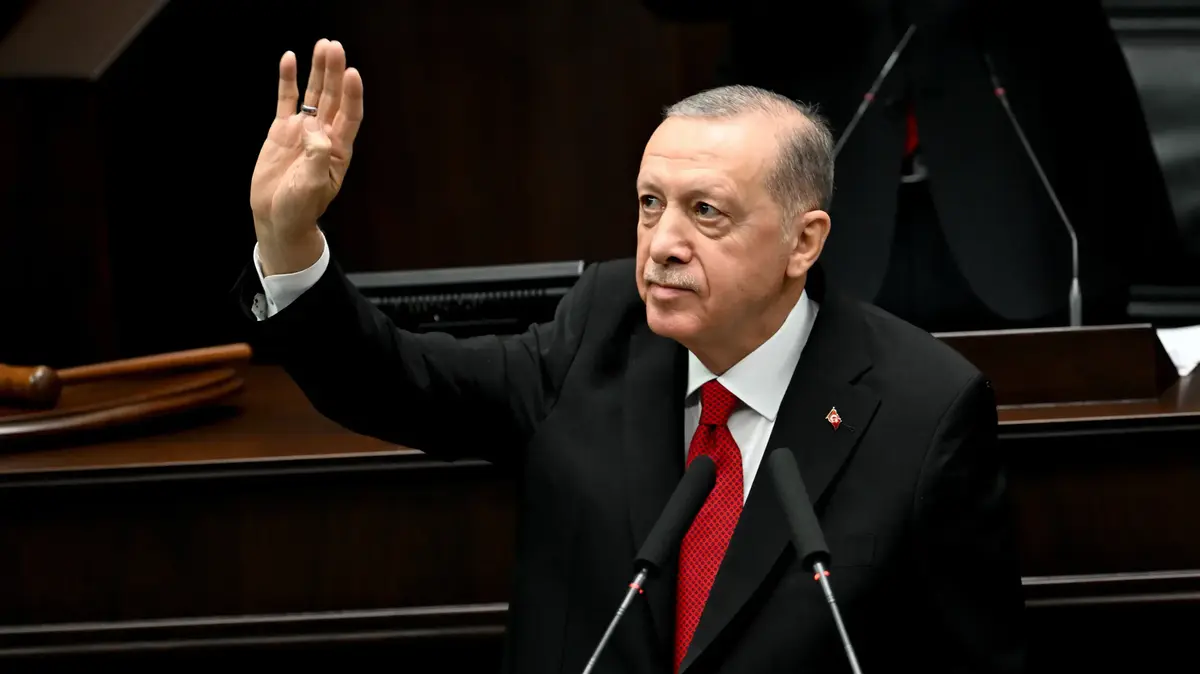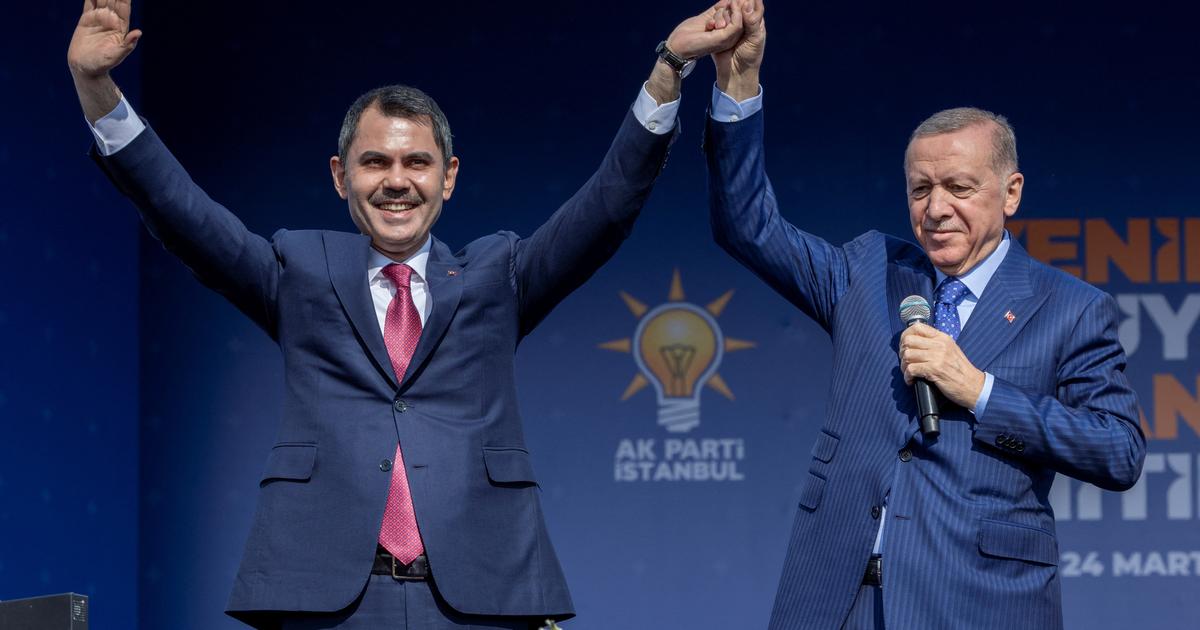Turkish President Recep Tayyip Erdogan continues to take steps that distance him from the European Union, on whose door he was knocking insistently not long ago.
"There is no other party like this not only in Turkey but in the rest of the world!"
Erdogan's proclamations resounded last Wednesday after he was again elected by acclamation leader of his Justice and Development Party (AKP) at the seventh ordinary congress of the Islamist formation, during which he dedicated a good part of his speeches to charge against the opposition.
He spoke without a mask, although already vaccinated, before thousands of followers who packed the stands of the Ankara Arena sports hall, where they had arrived from all corners of the country despite the fact that Turkey is immersed in a third wave of COVID-19 infections (about 30,000 cases a day).
The tone of the speech was that of the politician seeking reelection, although Erdogan's term does not expire until 2023.
His recent decisions to withdraw Turkey from the European convention against sexist violence, fire the Central Bank governor, Naci Agbal, and start the process of outlawing the main Kurdish party have drawn harsh criticism from the opposition and abroad.
There are not a few in Brussels who consider that these measures have been a provocation, at a time when the EU offers a new opportunity for understanding to Ankara.
However, experts believe that this is what Erdogan seeks: to stoke polarization to avoid that, after almost 20 years in power, his support base is eroded due to the bad economic situation, perhaps with an eye toward an election. advance or in a referendum to approve a new Constitution.
“Erdogan believes that he can no longer expand his party's base of support.
In the past he tried, for example with the Kurdish peace process, but it did not go well, "explains political scientist Berk Esen, from Sabanci University:" These measures that create polarization are intended to consolidate his current base of support.
It is a strategy common to the right-wing autocrats ”.
Erdogan's AKP has been losing voters progressively: from 50% obtained in the November 2015 elections, it went to 42.5% in the 2018 elections and, currently, it is at 37% according to the average of thirty surveys of the last three months.
Support for its partner in government, the far-right MHP party, is also declining and the voting intention of the entire opposition outpaces that of the government alliance parties.
“The difference is still small and the ruling coalition can still turn it around.
If that difference starts to grow, then Erdogan will have it more difficult, "says Özer Sencar, director of the MetroPoll demo company.
“In our monthly polls, public opinion is pessimistic.
60% believe that the country's situation is getting worse and only 20% that it is improving.
But even so, the population still does not see the opposition as a better government alternative ”, he adds.
The EU offers Erdogan a new opportunity for understanding
The Turkish lira falls 17% against the dollar after Erdogan dismisses the head of Turkey's central bank
The departure of the European Convention for the Prevention of Domestic Violence and Violence against Women, better known as the Istanbul Convention, decreed by the president last weekend, arose from an artificial debate, as shown by the fact that until a few years ago months, a good part of the Turks (between 46% and 52%, according to the survey) were unaware of the content of this treaty.
And, among those who knew him, the majority was against leaving the convention.
However, several religious congregations and the ultra-
Islamist
newspaper
Yeni Akit
launched a campaign and convinced the Government that the instrument attacked the values of the traditional family.
“The Istanbul Convention, originally aimed at promoting women's rights, has been hijacked by a group of people trying to normalize homosexuality, which is incompatible with Turkey's social and family values.
Hence the decision to withdraw, "justified Fahrettin Altun, communication director of the Turkish Government, although the only mention of the issue in the treaty is that the rights and obligations it imposes must be" without distinction of sexual orientation.
The same has happened with the protests that, since January, have been taking place in the universities against the imposition of rectors by Erdogan - for which there are still dozens of arrests - and that the government narrative has turned into a culture war on the collective LGTBI.
# Turkey About 60 arrested in the last two days in student protests.
They began three months ago against a rector assigned by hand by the Government and claims have been added for freedom of expression and LGBT https://t.co/YVg2Ch9QBG
- Lara Villalón (@vm_lara) March 26, 2021
The repression against the HDP, the main pro-Kurdish party in Turkey and the third with the most seats in the Turkish Parliament - thousands of whose militants are in prison accused of terrorism and against which the Prosecutor's Office has opened a process of illegalization - aims to to please his far-right nationalist ally, believes political scientist Esen, as well as to attract voters from a nationalist opposition party, the IYI Parti, led by a rising political leader, Meral Aksener.
On the contrary, it risks definitively alienating the Kurds, almost a fifth of the country's population and among which the AKP is the second most voted party.
From the European Union, not a few consider it a provocation that these measures were taken just a few days before the European Council in which, as proposed by the high representative for foreign policy, Josep Borrell, a “positive agenda” was offered, instead of opt for the sanctions demanded by countries like France, Cyprus and Greece.
A European diplomatic source maintains that "Ankara has shown signs of de-escalation, has withdrawn its ships from Greek and Cypriot waters in the eastern Mediterranean and has initiated contacts with Athens."
The same source, who prefers to remain anonymous, adds: “The fear is that if we break with Turkey, it will definitely move away from democracy and the EU.
But there is a group of countries that want Turkey and, of course, these measures that move the country away from European values do not help.
We will see if sanctions are applied at the next European Council in June ”.
Short term strategy
“Erdogan no longer thinks long-term, but lives week by week.
This month, for example, it has been guaranteed that there are no European sanctions.
That's enough for him, "says Berk Esen:" In his speech before the congress of his party, which was to be a manifesto around 2023 [the Republic's centenary and electoral year], there was no concrete proposal, no plan, perhaps with exception to the mention of 'increasing the number of friendly countries', which indicates that perhaps he will reduce his anti-Western rhetoric and seek a compromise in his disputes with the United States ”.
“Every month, we ask people what are the main problems in the country.
And 60% mention unemployment, difficulties making ends meet or other economic issues as the main problem.
Justice and democracy are issues that are far behind as long as there are economic problems, ”says Sencar.
Hence, the recent expulsion of the governor of the Central Bank, the third in 20 months.
Despite having stabilized a lira in free fall, it did so at a high cost: raising interest to 19%.
Erdogan will want to lower them and force a cheap credit bubble that gives a sense of growth as it did in 2020, when Turkish GDP increased by 1.8% despite the pandemic.
However, unemployment also increased, especially among the poorest sectors, and growth did not benefit workers.
Although Erdogan and the MHP have quelled rumors of an early election, the opposition believes there could be elections in the fall.
“It would not make much sense to advance the elections because it would mean throwing away the two years of the president's remaining mandate.
But the longer it takes to call them, the more the opposition will increase its chances of winning ", believes Berk Esen:" So if Erdogan sees himself as strong enough to win and manages to pass a change in the electoral law that benefits him, there will be early elections " judgment.
.








/cloudfront-eu-central-1.images.arcpublishing.com/prisa/KMEYMJKESBAZBE4MRBAM4TGHIQ.jpg)


